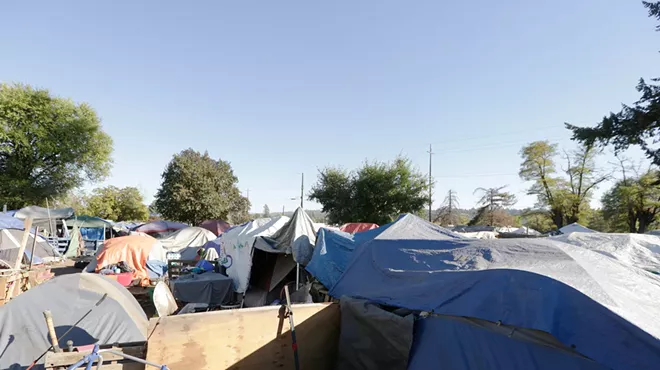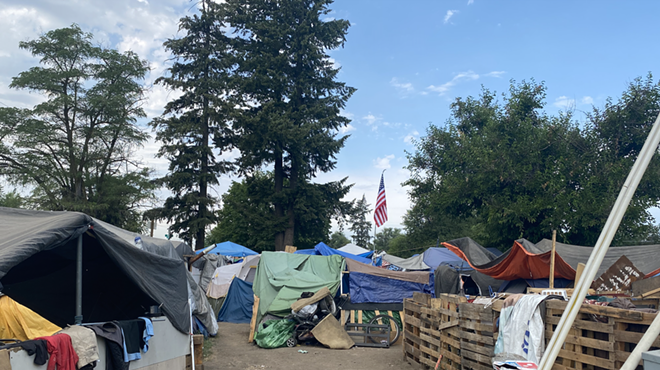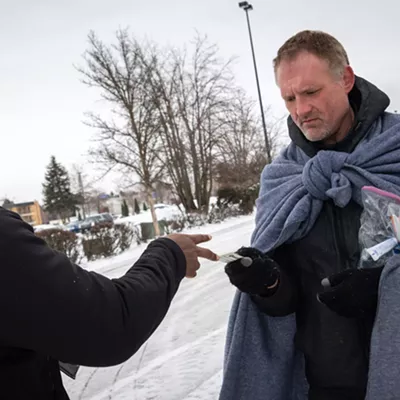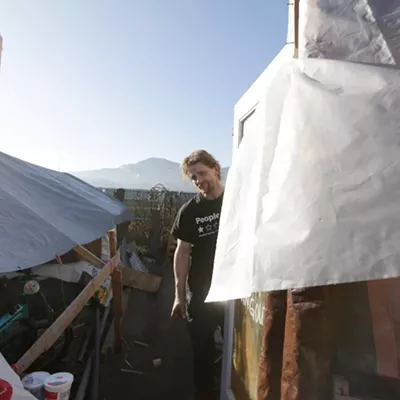
For months now, organizers at Camp Hope have been relying on a neighbor's hose and diesel generators to provide water and electricity to the East Central homeless encampment's estimated 465 residents.
Officials from the Washington State Department of Transportation, which owns the land Camp Hope occupies, say they've repeatedly asked the city to provide water and electricity to the camp. The city hasn't done that.
Camp organizers say the city's refusal has been frustrating and made their work more difficult. The camp is next to the city's water and power lines, and Ryan Overton, communications manager for WSDOT's eastern region, argues that it would be easy for the city to connect the camp to those services.
Brian Coddington, the mayor's spokesperson, says the city's expectation is that the camp is gone as soon as possible, and that connecting it to the city's electricity and water supply would give Camp Hope the appearance of permanency.
In an Oct. 28 email obtained by the Inlander, city administrator Johnnie Perkins told WSDOT that the city was willing to further discuss providing water and electricity — but with a few conditions.
Here's what the city was asking the state to do in exchange for water and electricity at Camp Hope:
1. Take down the privacy screening from the fence around the camp.
2. Use Washington State Patrol to patrol the area or pay for the Spokane Police Department's daily overtime shifts at Camp Hope.
3. Give the city the names of the camp residents who have been identified and given ID badges.
4. Pay the city for waste removal services.
5. Agree to a Dec. 1 deadline for decommissioning the camp.
In the email to WSDOT, Perkins, who didn't return calls seeking comment, added that he would encourage the state, county, city, Empire Health Foundation and Jewels Helping Hands to publicly announce "this collaborative solution to ensuring the health and safety of the site occupants." (Jewels Helping Hands and the Empire Health Foundation are being contracted by the state to do outreach and peer navigation at Camp Hope.)
"I also believe this would be received well by the neighboring businesses and community," Perkins wrote.
WSDOT wasn't having it. In a reply to Perkin's email, Mike Gribner, WSDOT's eastern region director, said his agency had discussed the city's offer and would not be agreeing to it.
"It is the agency position that water and electricity are basic human needs and integral to both the survival of the campers and decommissioning the camp, as such, should not be a chip to barter with," Gribner wrote.
Overton says WSDOT was increasingly concerned about the neighbor's hose freezing in the winter. After the email exchange, he says the state agency realized the city wouldn't be cooperating, and decided to take matters into their own hands by paying for a truck to deliver water to the camp. The first tank of water arrived last week.
Gribner tells the Inlander that the city's refusal to provide water and electricity has been a major frustration, and that the city's list of demands felt ill-considered.
"We don't like bargaining with basic human needs," Gribner says.

At Camp Hope, people like Sharyl Brown meet with unhoused people to guide them through the complicated process of applying for housing and other services. Brown works for Jewels Helping Hands, and used to be homeless herself. Her experience helps build trust with camp residents and relate to what they're going through.
It's a tough job. When asked what would make the work easier, Brown gives two answers: electricity and water.
Brown meets with camp residents in the service tent to do interviews, but it's hard to talk over the cacophony of the generators. Imagine trying to fill out housing paperwork and talk to a stranger about your medical or substance use history while shouting over the noise.
"It's impossible to have a real conversation in there," Brown says.
Brown says she normally just asks clients to step outside the tent so they can talk in peace. She does the same for our interview. But going outside just defeats the whole purpose of the service tent. And it's getting cold.
"It's a huge barrier," Brown says.
The state agency had specific objections to the city's demands:
1. Take down the green privacy screen
Before the privacy screen went up, Overton says campers were putting their own tarps on the fence for privacy, which made parts of it impossible to see through. He argues that the new mesh screening is still allows for some visibility into the camp, while still offering privacy for the residents.
2. Have Washington State Patrol at the camp or fund Spokane police shifts
For months, the city has been paying police officers overtime to patrol outside the camp on a daily basis. Overton notes that WSDOT never actually asked the city to station police outside the camp in the first place, and that the state agency is already paying for a private security company to patrol the camp.
3. Provide a list of the campers' names
Coddington says the city wanted the list of names so they could verify how many people are actually at the camp. He says the city is concerned the camp might be growing. WSDOT and service providers have said new residents are no longer allowed to move into the camp, and that the total population has been steadily shrinking.
When asked if the city wanted the list of names so police could check for warrants, Coddington says no, and adds that he doesn't think all the names on the list are valid legal names anyway.
4. Pay for waste removal
5. Agree to a Dec. 1 deadline for decommissioning the camp
"THE MOST HUMANE PLACE FOR PEOPLE TO BE"
Coddington argues that the city is providing water and electricity to homeless people — not at Camp Hope, but at the recently-opened Trent Resource and Assistance Center. The city has touted the shelter as part a key part of its plan to close Camp Hope, and is working to expand the shelter with additional beds and amenities so it can accommodate people from the camp.
"That's the most humane place for people to be," Coddington says. "Especially now during extreme winter cold weather."
Trent is a congregate shelter in a converted warehouse in an industrial area. It has a capacity of 275 beds, and efforts are underway to expand the capacity to 500.
When a 70-mile-per-hour windstorm hit earlier this month, the city made arrangements for two city buses to take people from Camp Hope to the Trent shelter. Only three people took them up on the offer, Coddington says. He notes that Camp Hope started in 2018 as a protest over a lack of low-barrier shelter beds in Spokane. The city added shelter beds, he says, why has the ball moved?
Coddington argues that the process of connecting homeless people to stable, more long-term housing is best done indoors — not in a cold field.
"The city is offering a way to be indoors while they're waiting to access houses," he says.
The Trent shelter is being operated by the Salvation Army, who took over earlier this month after a fraud scandal involving the previous operator, the Guardians Foundation. On Wednesday, RANGE Media reported that several staff members at Trent had described chaotic, unsanitary conditions at the Trent shelter. They described overflowing portable toilets, medications being taken from guests for hours on end, inadequate supply of drinking cups and blankets and spoiled meals.
In a statement to the publication, Kirstin Davis, the city's communications manager, said challenges are always expected when a change in operations happen quickly, and that the feedback had been shared with Salvation Army staff.



























